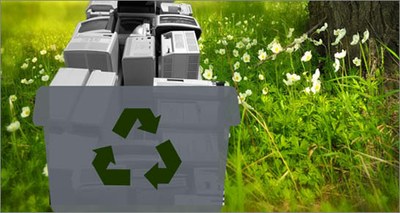Circular economy: At the start EU project on e-waste recycling
29/11/2018
Identify innovative systems for tracing and improving the collection of electric and electronic waste (WEEE) in urban areas and developing methods for prolonging the life cycle of reusable products, based on circular economy principles. This is the objective of the European project Inno-WEEE, which aims at making the WEEE supply chain more efficient with the application of circular economy models. These full scale models will be tested in Trento, Cava de 'Tirreni (Salerno) and Bath (United Kingdom).
 In addition to ENEA and the three local administrations, the Fondazione Bruno Kessler and the companies Ecodom, Metellia Servizi and Dedagroup (coordinator), in Italy, and the company Better Points in the United Kingdom will also participate in the project.
In addition to ENEA and the three local administrations, the Fondazione Bruno Kessler and the companies Ecodom, Metellia Servizi and Dedagroup (coordinator), in Italy, and the company Better Points in the United Kingdom will also participate in the project.
In particular, ENEA will develop and make available to the citizens of Cava de 'Tirreni a system of innovative containers and a platform of data also useful for the traceability of waste.
ENEA will also provide technical and scientific support to the Public Administration concerning the environmental impact of the waste chain, the development and transfer of innovative methodologies and tools for a shared adoption by the citizens of the best practices available, as well as training and real time information to users, with the possibility of contributing to strategic planning in the sector.
After a first part of the project dedicated to the study of the current configuration of the collection of small household appliances by citizens, schools and offices, innovative mechanisms will be developed to encourage citizens to properly dispose of e-waste and a chain for the reuse of electrical and electronic appliances still functioning. The Agency will also start field testing regarding the collection, traceability and life extension of devices also through reward systems, such as "gamification", i.e. the use of elements borrowed from games.
"The efficiency of the WEEE supply chain represents a complex challenge in Italy and in Europe, since citizens tend to keep WEEE at home or dispose of it in an improper manner, with negative repercussions on the entire waste chain", Marco Tammaro of the ENEA Laboratory for Reuse, Recycling, Recovery and Valorization of Waste and Materials, pointed out.
"The latest statistics tell us that in Italy every year only 4 kg of WEEE per inhabitant are recovered, with an average annual production of about 13 kg per capita. In order to optimize the collection, we will provide local authorities with the best circular economy models developed in years of activity, also by participating in international projects ", Tammaro concluded.
Funded by the European Institute of Innovation & Technology (EIT) fund, with the support of EIT Climate-KIC- the largest public-private partnership operating in the innovation sector to accelerate the transition to a zero-emission economy- the project is one of the innovative projects presented by ENEA at Ecomondo.
For more information please contact:
Marco Tammaro, ENEA –Laboratory for Reuse, Recycling, Recovery and Valorization of Waste and Materials marco.tammaro@enea.it
